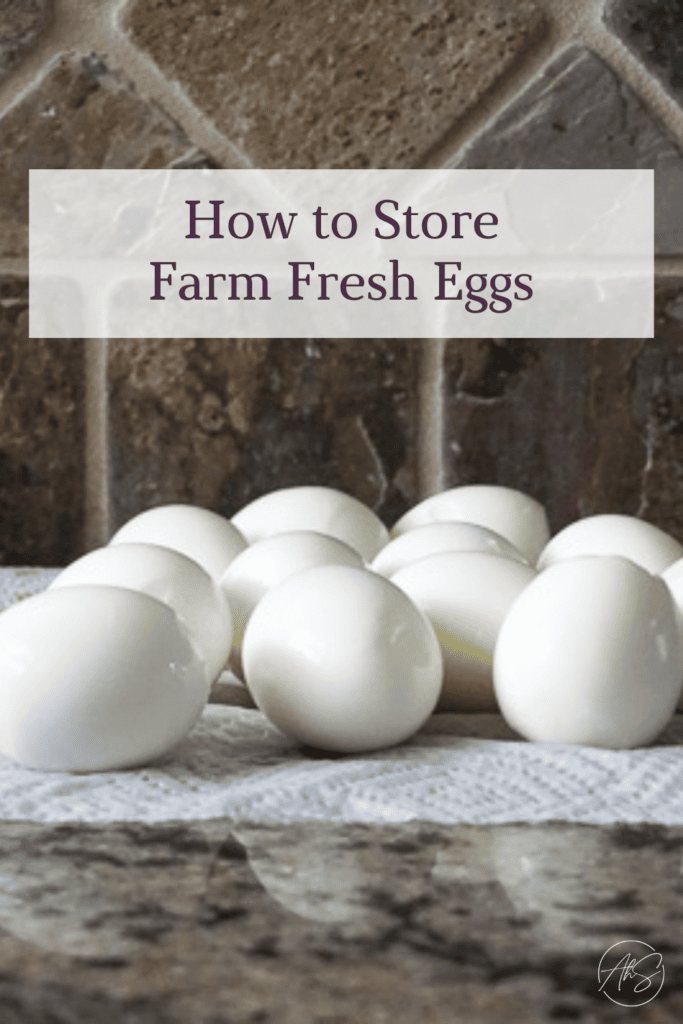How To Store Farm Fresh Eggs

[ad_1]
You might be saying- what a funny post to be written by someone that doesn’t own chickens. And to you, I say yet. 😉 I just know chickens are in my future at some point so in free time I like to learn about best practices. Until I can use the tactics myself, I pass the info along to my friends with feathered egg layers of their own. If that’s you, please chime in with any other helpful info!
Eggs are some of the best protein sources you can find with their versatility and adaptability to so many protein-rich snacks and meals. However, not all eggs are created equal. I believe any egg is better than no egg at all, but there are some differenced between them.
Store-bought eggs are improving on offering high quality varieties, but farm-fresh eggs are something special. In general, farm-fresh eggs are more flavorful and have brighter yolks than their store-bought counterparts. Whether you have your own backyard flock, or you’re lucky enough to know someone down the road who sells farm-fresh eggs, I highly recommend seeking some out and seeing if you can taste the difference for yourself.
Farm-fresh eggs tend to be healthier for you with vibrant yellow yolks and bright egg whites. This is because most farm-fresh eggs come from chickens that are allowed to forage for their own food which leads to eggs that are higher in nutrients. I always giggle at the “100% vegetarian fed” messaging on some egg cartons because chickens aren’t vegetarians. Their varied diets include worms and grubs that help add nutrients to their eggs.
Farm-fresh eggs have different storage requirements than store-bought eggs. I’ve gathered together a few must-know tips for storing farm-fresh eggs so the next time you’re ready to make an omelet or some hard-boiled eggs you have the freshest eggs available.


How To Store Farm Fresh Eggs
You have a few options when it comes to storing farm-fresh eggs. Here are some tips that will help you store your eggs so they’re as fresh when you eat them as they were when you collected eggs from the nest boxes of your backyard flock.
Unwashed Eggs Are Best Stored At Room Temperature
Freshly laid chicken eggs don’t have to be kept in the fridge. Chicken eggs come with a protective bloom surrounding them that’s designed to keep bacteria away from the interior of the egg. This protective bloom is washed away as soon as the eggs come in contact with any type of liquid, including water.
- When you collect eggs from your backyard flock, get rid of any that appear to be cracked. Bacteria may have entered these eggs, making them unsafe to eat.
- Instead of washing with water, clean eggs by gently brushing away dirt and debris with a piece of fine sandpaper or a soft brush.
- Store unwashed eggs in egg cartons on the counter — at room temperature —for up to two weeks.
How to Properly Clean Freshly Laid Eggs
Sometimes the amount of dirt or poop on the eggs can’t be easily brushed off. When this happens, it’s best to wash your eggs, even if it means you’re removing the protective bloom coating.
- Use warm, running water to wash your fresh eggs.
- You can use your fingers to gently remove dirt, or use a soft bristle brush.
- Eat your eggs right after washing, or store them in the fridge.
If You Wash Your Eggs, Store Them in The Refrigerator
Once an egg has been washed, it needs to be stored in the fridge because the protective bloom coating has been removed. Refrigerated eggs are kept at temperatures low enough to prevent bacteria from surviving on the eggshells.
- All store-bought eggs have been washed and pasteurized so they need to be stored in the fridge.
- Store fresh eggs in the fridge in egg cartons to prevent them from cracking.
- Using the fridge for egg storage extends the life of your eggs since refrigerated eggs will last two to three months.
Keep Track of Your Eggs to Use the Oldest Eggs First
It’s helpful to have a system in place that will keep track of the age of your eggs. This allows you to use up your oldest eggs first. There are a few ways you can store freshly laid eggs that’ll keep track of your egg’s age. Which option you choose will depend on how many eggs you have and how quickly your family eats this protein-rich food.
- Find — or build — a countertop egg storage rack. Egg skelters have a spiral shape, so the oldest egg is at the back, and the newer eggs slide down to the front. You can also find wooden tray options that use the same system.
- Label egg cartons using a permanent marker with the day of the week you collected your eggs. If each egg carton is assigned a day you’ll know exactly when your eggs were collected.
- Write the egg collection date right on the shell with a pencil! Markers and pens will leech into the absorbent eggshell, but pencil marks will sit on the surface of the shell so you can easily read what you wrote.
Freshly laid eggs are a tasty, protein-rich addition to your meals and snacks. Since you don’t have to wash them until right before you eat them, you can take advantage of nature’s built-in protective barrier that chickens form around their eggs. This allows you to store farm fresh eggs for a long time, giving you access to their fresh flavor weeks — or even months — after your hen laid their eggs.
Do you have any tips for storing farm-fresh eggs? Let me know if any tip surprised you in the comments!
[ad_2]





